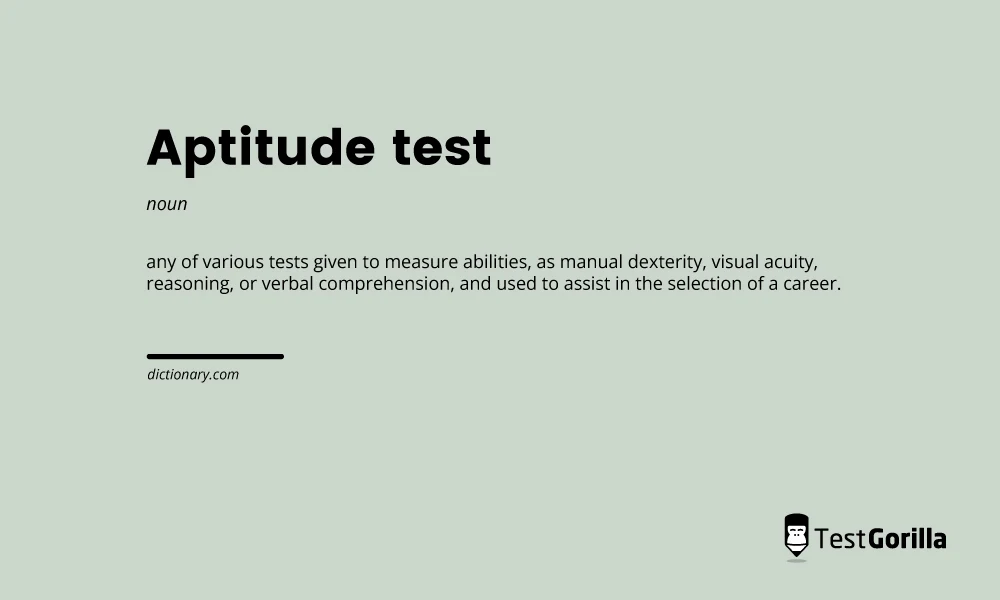The types of aptitude tests suitable for candidates: Everything you need to know
In the last couple of years, aptitude tests have become a staple of every successful hiring process. It’s no wonder that so many companies have started using skills tests in their hiring processes: They’re a fast, reliable, and bias-free method of assessing candidates and finding the perfect fit.
However, those are not the only benefits of using these tests in your recruitment process. In this article, we’ll go over:
Why companies use aptitude tests
How they benefit the entire hiring process
What types of aptitude tests are out there
But first, let’s see what aptitude tests actually are.
Table of contents
What are aptitude tests?
Aptitude tests (sometimes called cognitive tests) are tests that assess the candidate’s logical reasoning skills, mental abilities, and different types of intelligence.
Are aptitude tests IQ tests, though? In short, no. They measure different cognitive abilities but don’t measure intelligence as such. In fact, we don’t recommend using IQ tests in hiring.
Aptitude tests work wonders in the hiring process, enabling hiring managers to easily assess applicants’ skills even before the interview stage. With the information the hiring managers receive from the aptitude tests, they can make better and more informed decisions.
Mis-hires can be very expensive – the cost of hiring the wrong candidate can ramp up to $240,000 – so hiring managers need to make sure to hire the right person. Using cognitive tests is one of the best ways to do that.
However, cost-saving is only one of the benefits of using aptitude tests in your hiring process. With that in mind, let’s go over all of their benefits to see why you should use them to make better hiring decisions.
Why should you use aptitude tests?
Aptitude tests have plenty of benefits, so it definitely makes sense to implement them in your hiring process. The following list isn’t exhaustive but it contains all the important answers as to why every company should use cognitive-ability tests.
These factors will also provide the biggest return on investment.
Aptitude tests:
Are bias-free
Using aptitude tests gives all candidates an equal opportunity to succeed, as they shift the focus from having the right resume or relying on the “gut feeling” of the hiring manager to being able to demonstrate one’s actual skills. All candidates take the same tests and are, therefore, on an equal footing.
The hiring team receives all test scores and can easily make objective decisions. This creates a bias-free environment where candidates are only judged on their skills and capabilities, instead of on how well they wrote their resumes.
Provide lots of additional information
For hiring managers to make informed decisions and hire the right candidates, they need to have a lot of data on the candidates. It’s nearly impossible to call and interview every single applicant; it takes too much time and interviewing should be saved only for a handful of candidates.
But how do you shortlist the best candidates? Do you use resumes, which are notoriously bad at predicting job success? Or do you use aptitude tests to make data-based decisions?
Save time
For every job opening, you might get dozens or even hundreds of applications. So if your company needs to hire for five roles for the company and you get 80 applications per role, your hiring team would need to sift through more than 400 resumes.
Now, just imagine if you had to invite all of those people for an interview to assess them and see if they’re the right match. The hiring manager, working 8 hours a day, would have to spend more than a month just to interview all candidates! Even just reviewing all resumes would prove to be very time consuming (and, not to mention, inaccurate).
That’s why more and more companies use aptitude tests today: They enable you to objectively evaluate applicants’ skills and only invite the top candidates for an interview, which helps you save countless hours.
Are objective
When companies rely on resume screening, they are never sure if the candidates they shortlisted are the right ones.
On average, a resume gets only seven seconds of attention from the hiring manager. And even then, candidates often have no idea what they need to do to be noticed by the hiring manager and be shortlisted for a job role.
It’s a subjective process where unconscious bias reigns supreme, no matter how well-prepared the hiring manager is.
But with skills tests, you’re eliminating the subjectivity from the process and replacing it with data: The candidates get an invitation, complete the assessment, and you receive their test results.
This makes the entire process as objective as possible – which gives all applicants an equal opportunity to prove themselves and be noticed.
Improve the quality of hire
Using pre-employment assessments in your hiring process gives you more data on your candidates. With a single assessment, you can evaluate different skills and even match candidates with other open positions.
Are their communication skills up to par with the others on the team? Are they a good team player? Will they contribute positively to the organizational culture? Do they have the right technical skills?
Skills tests enable you to find out all that – and more.
All these data points help you hire the right person each time, which enables you to improve the overall quality of hire at your company.
Help you improve your learning and development initiatives
Not only does the hiring manager benefit from using aptitude tests, but the entire HR team as well.
For example, the person who manages learning and development at your company will have data that informs them about their employee’s capabilities and potential skill gaps.
Or, otherwise said, knowing the strengths and weaknesses of each new hire enables you to tailor future training sessions to new employees’ individual needs and be more efficient at upskilling them.
Help match the candidate to the best role for them
The candidates, no matter how good their research skills are, only have a superficial understanding of how your company operates. You, as the hiring manager, understand the company way better and can easily notice when a candidate is better suited for another role.
Maybe the candidate applied for one position, but their test results made you realize that they’re perfect for another role – for which you can now invite them to apply. Without skills tests, however, you wouldn’t be able to make this decision.
Types of aptitude tests
So, what are the different types of aptitude tests?
There are thousands of aptitude tests available out there, but all of them fall under a couple of categories:
Numerical-reasoning tests
A numerical-reasoning test will assess candidates’ abilities to read graphs, identify numerical patterns, analyze numerical data, and draw insights from datasets.
With the digitalization of most professions and workplaces, numerical reasoning has become essential for many roles, especially in finance, marketing, product development, and customer success. If an employee would need to interpret charts, graphs, diagrams, and tables, a numerical-reasoning test will enable you to find out whether they have the right skills for the position.
With TestGorilla’s Numerical-reasoning test, you’re able to evaluate candidates’ skills when it comes to interpreting numbers, fractions, and percentages, as well as to understanding patterns and analyzing and gaining insights from tables and charts.
Verbal-reasoning tests
A verbal-reasoning test will help you assess whether the candidate has the necessary logical skills to analyze and understand the relationships between words and phrases presented in written form.
Verbal-reasoning skills are essential in the workplace: Many sub-skills, from solving problems to following instructions, fall under the larger category of verbal reasoning – so consider implementing a verbal-reasoning test into your hiring process.
If you use TestGorilla’s Verbal-reasoning test, you will be able to evaluate candidates’ abilities to find analogies, understand premises, and follow instructions from supervisors.
Spatial-reasoning tests
A spatial-reasoning test will help you assess whether the candidate can recognize the connections between two- and three-dimensional objects in space.
Most STEM-related (science, technology, engineering, and math) jobs require strong spatial-reasoning skills, so if yours falls in this category, asking applicants to take a spatial-reasoning test will enable you to make a better hiring choice.
So if you’re hiring for the role of a mechanical or chemical engineer, architect, or researcher, for example, using a spatial-reasoning test will help you find the perfect candidate.
TestGorilla’s Spatial-reasoning test enables you to assess your candidates’ skills when it comes to mental rotation and folding, spatial visualization, and spatial working memory.
Mechanical-reasoning tests
A mechanical-reasoning test evaluates your candidates’ understanding of basic mechanical and physical concepts. Candidates who score well on this test understand how forces work, how velocity impacts physical objects, and how pulleys, gears, and wheels function.
When hiring candidates for roles such as HVAC engineers, carpenters, plumbers, or automotive engineers, or any other role requiring mechanical reasoning, ask them to take a mechanical-reasoning test.
TestGorilla’s Mechanical-reasoning test enables you to assess your candidates’ understanding of pulleys, gears, wheels, forces, and general movement of physical objects.
Reading-comprehension tests
Reading comprehension tests help hiring managers assess candidates’ ability to read a text and make sense of it. Reading comprehension is crucial in today’s workplace, where communication often takes the form of emails, chats, and memos.
A strong candidate will pass the reading comprehension test with flying colors. You can use it when hiring for roles such as editors, analysts, or managers, to see who your best applicants are.
The results of TestGorilla’s Reading-comprehension test will tell you who has the right analytical skills to interpret written information correctly.
Math tests
Math tests help you assess whether your candidates can do basic and advanced mathematical operations. This can be extremely useful when hiring a candidate that will be working with finances in any form, such as accountants, cashiers, computer programmers, auditors, and more.
With TestGorilla, you can choose one of the three following to assess the mathematical literacy of your candidates:
Problem-solving tests
Contrary to factory workers from the early 20th century, today’s employees need to be able to quickly find and propose inventive solutions to problems; this is where strong problem-solving skills come into play. Companies can use problem-solving skills tests to ensure they’re picking the right candidates.
TestGorilla’s Problem-solving test helps you see whether the candidate can analyze information to make the right decisions.
Decision-making tests
Most employees today have a lot of flexibility and autonomy in the workplace. So, to be effective and successful, they’ll have to make the right decisions consistently. It’s no longer possible to outsource every decision to the manager; the employees are now part of the decision-making process.
This means it’s now imperative for companies to assess how well employees handle decisions in the workplace and how they approach the decision-making process.
With a Business-judgment test, you’ll have a tool to objectively assess candidates’ ability to make the right call each time.
Personality tests
And last but not least are personality tests. While they’re not aptitude tests in the strict sense (they don’t measure abilities, only personality traits and predispositions), you can use them in conjunction with aptitude tests to make better hiring decisions.
There are different personality tests that companies can use to understand the values, beliefs, and behaviors of their candidates.
It’s essential for an organization to hire people who share the same values and outlook towards the world and life; the bigger the convergence of values, the more the employee will feel “at home” in the company.
With personality tests, you’re not looking for someone with whom you can have a beer, but someone who shares the company’s values and can add to the company’s culture. Otherwise said, don’t look for culture fit, look for culture add instead.
With TestGorilla, you can give your candidates personality tests such as:
Enneagram personality test (included in our free plan)
16-personalities test (included in our free plan)
DISC test (included in our free plan)
Big 5 (OCEAN) test (included in our free plan)
Use aptitude tests to hire better
No matter the position you’re trying to fill, you should give your candidates aptitude tests to assess their skills objectively. This enables you to make better hiring decisions and build a bias-free, stress-free recruitment process.
Sign up for a free demo session to get a firsthand look at TestGorilla in action – and see for yourself how pre-employment testing can help you hire the right people for each new open role.
Related posts
Hire the best candidates with TestGorilla
Create pre-employment assessments in minutes to screen candidates, save time, and hire the best talent.
Latest posts
The best advice in pre-employment testing, in your inbox.
No spam. Unsubscribe at any time.

Hire the best. No bias. No stress.
Our screening tests identify the best candidates and make your hiring decisions faster, easier, and bias-free.
Free resources
This checklist covers key features you should look for when choosing a skills testing platform
This resource will help you develop an onboarding checklist for new hires.
How to assess your candidates' attention to detail.
Learn how to get human resources certified through HRCI or SHRM.
Learn how you can improve the level of talent at your company.
Learn how CapitalT reduced hiring bias with online skills assessments.
Learn how to make the resume process more efficient and more effective.
Improve your hiring strategy with these 7 critical recruitment metrics.
Learn how Sukhi decreased time spent reviewing resumes by 83%!
Hire more efficiently with these hacks that 99% of recruiters aren't using.
Make a business case for diversity and inclusion initiatives with this data.



















